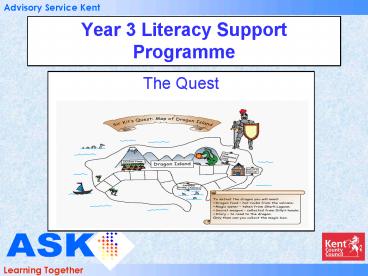Year 3 Literacy Support Programme - PowerPoint PPT Presentation
1 / 17
Title:
Year 3 Literacy Support Programme
Description:
... IS NOT A PHONICS PROGRAMME but is in line with a synthetic phonics approach ... 4 group sessions a week and 1 independent activity. 3 warm up sessions page 39 ... – PowerPoint PPT presentation
Number of Views:34
Avg rating:3.0/5.0
Title: Year 3 Literacy Support Programme
1
Year 3 Literacy Support Programme
- The Quest
2
Aims of the course
- To introduce the Y3 Literacy Support Programmes
structure and materials - To identify the features of effective teaching
and support in Y3 - To prepare staff to implement intervention
3
Linking intervention to inclusionThe SEN code
of practice describes a graduated response to the
identification of special educational needs. The
Primary National Strategy assumes 3 waves of
support for children
Wave one
Wave two
Wave three
4
Wave 1
- Quality First Teaching
- The effective inclusion of all pupils in a high
quality daily mathematics lesson or literacy hour
5
Wave 2
- Small group intervention for children who may or
may not be receiving additional SEN support - For children who are underachieving but with
short term intervention such as ELS, Year 3
intervention, FLS.
6
Wave 3
- Specific, targeted approaches for
- individual children identified as requiring
- SEN intervention
- Highly personalised to meet individual needs
7
ROSE REPORT
- More attention needs to be given to promoting
speaking and listening skills - Active, multi-sensory phonics teaching
- Fidelity to one phonics programme (synthetic in
structure) - Importance of good quality first teaching
- Note
- SIR KITS QUEST IS NOT A PHONICS PROGRAMME but is
in line with a synthetic phonics approach
8
WHAT IS YEAR 3 LITERACY SUPPORT?
- For year 3 children who are working at just below
age-related expectations (level 2c or top of
level 1a) - It is 16 week programme with a daily 20 minute
input making a total of 64 group sessions led by
either the teacher or teaching assistant - 1 session per week is an independent task
- Includes screening materials and materials to
monitor progress
9
WHAT WILL THE CHILDREN BE LEARNING?
- Revising key literacy objectives from Y2 and Y3
- Consolidate their learning
10
IDENTIFICATION OF CHILDREN
11
SCREENING MATERIALSpages 333-353
- Children working at age or above age related
targets do not need screening - Screen those children not working at age related
targets - Use flowchart (p.354) to help select the support
group - Select group from the results of this screening
12
HOW IS THE PROGRAMME ORGANISED?
- 3 modules of work, divided into two week blocks
- Each block has the same teaching sequence
- 4 group sessions a week and 1 independent
activity - 3 warm up sessions page 39
13
ROLE OF THE TEACHER AND TA
- Need for a partnership
- Teacher delivers first group session every week
(either guided reading or writing) - TA delivers three other sessions
- 1 session is an independent session
14
WHAT IS IN THE FILE?
- Introductory notes
- Resources needed page 18
- Overview- page 20
- Session notes and photocopiable materials
- Screening materials -page 333
- Progress checks and target cards
15
KEY FEATURES OF THE PROGRAMME
- Assessment for learning
- Motivation and engagement
- Promoting independence
16
TARGETS
- Targets are a feature of the programme
- Focus on self evaluation and responsibility for
own learning - May link to the whole class curriculum target
- May be connected to building confidence and
motivation
17
TRACKING PROGRESS
- Progress Checks
- Target Cards
- Evidence within the childrens work
- Observations during group work
18
EXIT STRATEGY page 358
- It is important that once the children have
exited the programme their progress is still
closely monitored.
19
WHAT NOW?
- Which children would benefit from this support?
- When/where could the sessions take place?
- What do we need to prepare beforehand?
- When shall we start the support programme?
- When/how often shall we discuss the childrens
progress? - How will we monitor the impact?
20
Advisory Service Kent Shepway Centre Oxford
Road Maidstone ME15 8AW Tel 01622 203800 Fax
01622 670509 www.kent.gov.uk/advisoryservice

